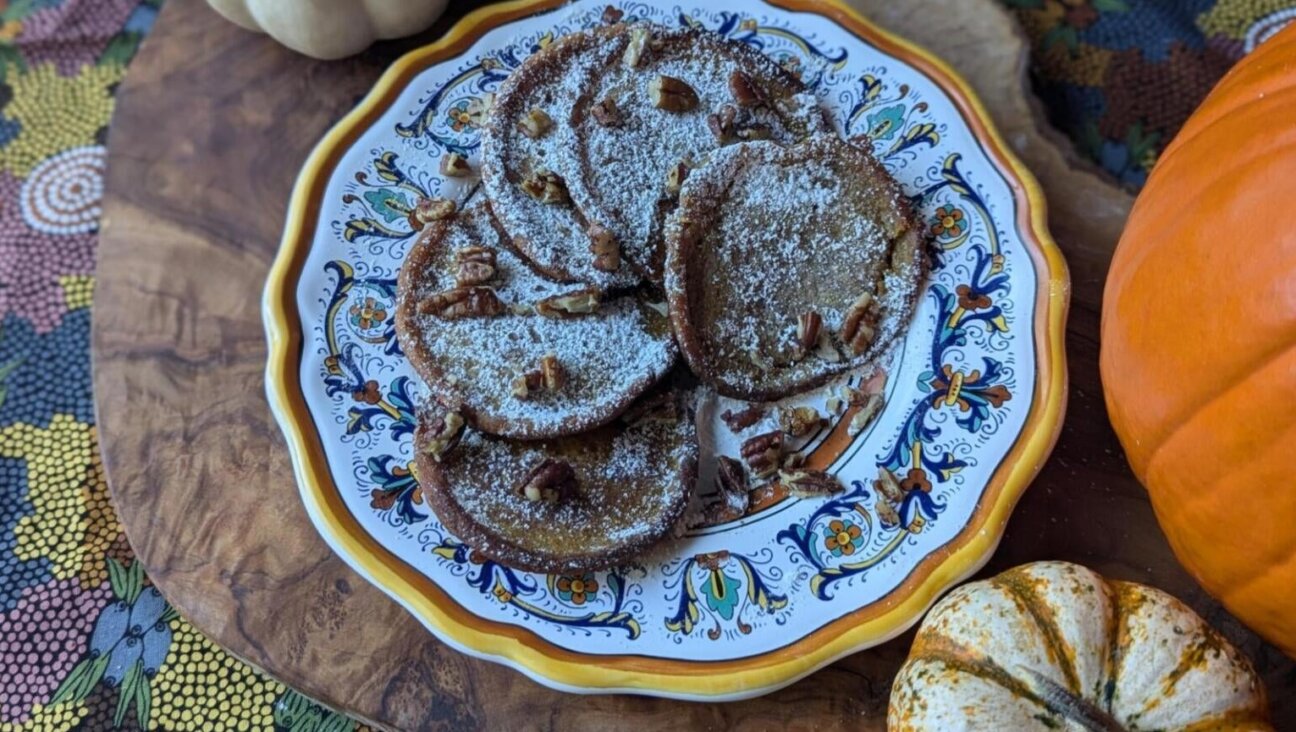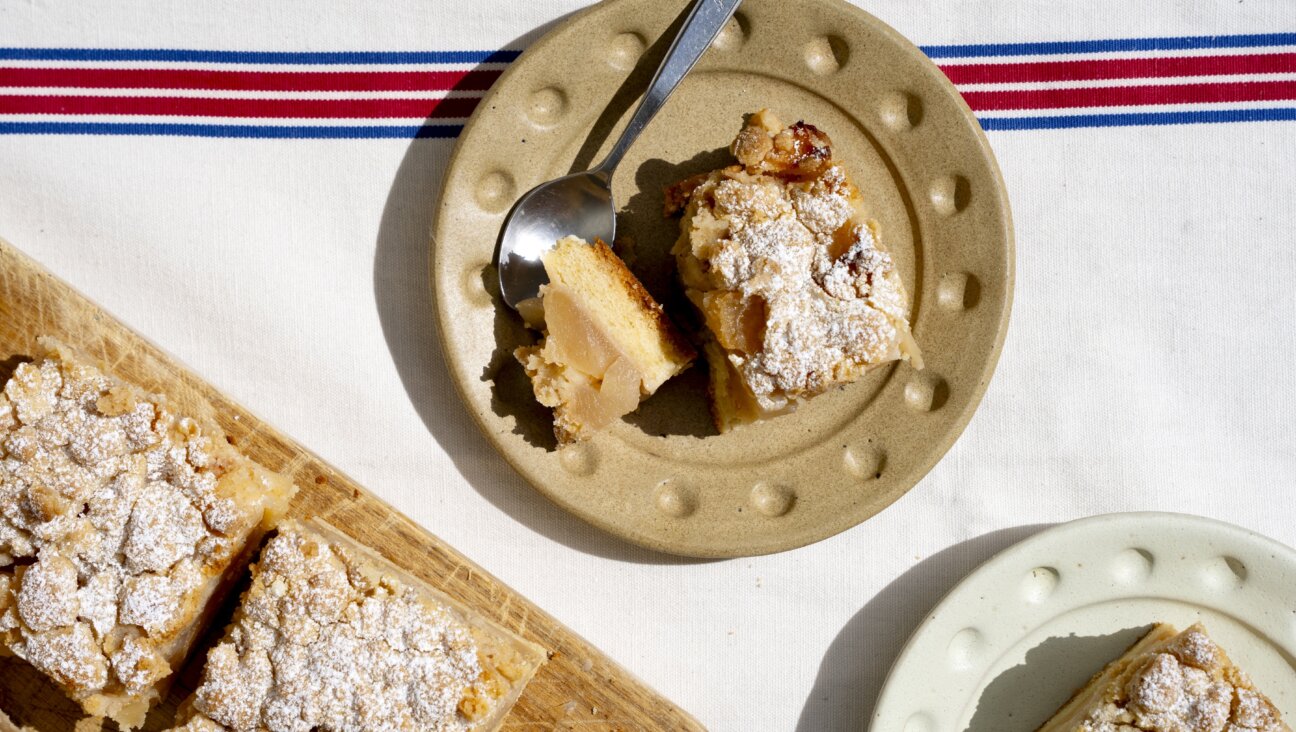Grandma Beauty’s Hamantaschen

Image by Courtesy of Dawn Lerman
In her recently published memoir (Berkley Books, September 2015), New York Times wellness blogger and nutritionist Dawn Lerman shares her food journey and that of her father, a copywriter from the “Mad Men” era of advertising at the Leo Burnett and McCann Erickson firms. Lerman spent her early childhood in Chicago constantly hungry as her ad man father pursued endless fad diets from Atkins to Pritikin, and insisted that Lerman and her mother adopt his diets to help keep him on track. As a child, Lerman felt undernourished both physically and emotionally, except for one saving grace: the loving attention she received from her maternal grandmother, Beauty.
Below is an adapted excerpt from Chapter 1 of “My Fat Dad,” in addition to a recipe for a healthier version of Beauty’s hamantaschen for Purim.
My maternal grandmother always told me that if just one person loves you, it is enough to make you feel good inside and grow up strong. For me, that person was my grandmother, Beauty.
I spent most weekends with my grandmother because my parents liked to go out and stay out late, and my mother hated to pay good money for a babysitter only to find her asleep on the couch with Tinker Toys and Mr. Potato Heads sprawled all over the plush white, blue, and green patterned shag carpet in the living room when she returned home.
My dad, an ambitious copywriter recently hired by the Leo Burnett Company in Chicago, was invited out pretty much every night, either to the Playboy Club for a members’ only dinner or to one of the new nightclubs on Rush Street for cocktails with his creative team.
“It’s a job requirement,” he would tell my mom, often returning home to our third-floor walk-up apartment as the sun was coming up.
I would spend most mornings, when I was not at my grandmother’s house, outside my parents’ door listening to them have the same argument over and over again.
“Taking Dawn to the sandbox once a day does not make you a good mother.”
“Putting a roof over our heads does not make you a good father or husband.”
Often, they would forget I was even in the house, raising their voices behind their closed bedroom door, and no matter how many times I knocked, they never seemed to hear. Even though I was only 3 and a half, I was often consumed with an overwhelming feeling of sadness and pain in my stomach that would linger from Sunday until Friday. I knew the days of the week because my grandmother showed me how to check them off on a calendar.
“There are only four checks between visits,” she would say.
Each and every Friday night, when I arrived at my grandparents’ house, my grandmother would run down her front porch stairs in her lacy matching nightgown-and-robe set and scream in excitement, “My little beauty, my little beauty!” I thought when I heard her say “beauty” over and over again, she was trying to tell me her name — so “Beauty” is what I called her. The name stuck, and soon everyone in her small neighborhood of West Rogers Park in Chicago knew my grandmother as Beauty—including my grandfather “Papa,” my mother, and all the neighbors.
The cooking aromas coming from her kitchen made my mouth water. Beauty always had a pot of something cooking on the stove, a freshly drawn bath, and a fluffy, lavender-smelling nightgown waiting for me. She would bathe me before we ate, softening my skin with cream and rose talcum powder that she dusted on my back with a big powder puff.
For meals, she would lift me up and sit me in a special chair, which she piled high with several phone books — both the White and Yellow Pages — and an overstuffed round corduroy pillow. She wanted to make sure I could see above the table, which was set with silverware that she polished every week and an embroidered tablecloth that my Papa brought back from New Orleans, where he would go to visit his racehorses, Glen and Phyllis, named after my mother and her brother Glen.
Beauty was the perfect name for my grandmother. She was like a shiny star that radiated light on the top of a Hanukkah bush. Everywhere she went, she made people smile. She would jokingly say she was Jackie Mason’s real wife — he just didn’t know it. But it was not that what my grandmother said was so funny. Rather, it was that she would just laugh so hard after she said something, that everyone else couldn’t help but join in.
“Laugh and people will laugh with you, cry and you will cry alone. The closest distance between two people is a good laugh.” That was a fortune cookie saying she saved and always kept in her pocketbook. Beauty emphasized how important it was to make others happy, even if it sometimes meant putting your own feelings aside.
“We do not know what goes on in anyone else’s house, but we can change their day by just saying hello and offering a kind gesture,” she said.
My grandmother wrote a poem about everyone she ever met. She would write them all out by hand and then her sister Jeannie would type them up so she could save them nicely in her album. “This is my favorite one,” she would say, then read the poem aloud.
As I lay on her lap, she would stroke my hair and I would ask her why she liked spending time with me, yet my mother did not. “Your mom loves you very much; she just has a funny way of showing it. You shouldn’t take it personally,” she said.
But no matter what my grandmother said, I often felt uneasy around my mother, knowing I could do something wrong at any minute — even if I was just sitting and reading. My mom was not very affectionate and she would constantly yell, “You’re invading my space!” when I got too close or tried to give her a hug. But Beauty was the opposite. She liked to spend time with me as much as I liked to spend time with her. We could sit around the table cooking and talking about our feelings for hours.
Beauty would say, “God is in my kitchen, not in temple” — which was really upsetting to her very good friend and neighbor, the rabbi next door. My grandmother lived in a neighborhood with many religious families, although Beauty never believed in organized religion or going to temple herself. “I am a culinary Jew,” she’d proclaim. “I honor tradition and those who came before me, and I want to pass the history of the food on to you. I can find my heritage in a bowl of soup. I believe in the power of sweet-and-sour meatballs. I believe that when I combine, eggs, raisins, cottage cheese, yogurt and baby shells into a kugel, I honor my own grandmother. I believe that stuffed cabbage connects me to my father, whom I miss. My bible is recipes that fill your soul and will keep you healthy and nourished for years to come.”
From the time I could hold a spoon, my grandmother involved me in the cooking process, allowing me to mix the onions, green peppers and bread crumbs for the salmon patties and decide what kind of soup we were going to prepare. And Beauty always made sure I was the one who tasted whatever we were making first. In her arms, I was never hungry for food, love, or affection. She was my mentor and my savior—saving my life, spoonful by spoonful.
THE RECIPE
Taken from Chapter 15 of “My Fat Dad,” this hamantaschen recipe includes almond and oat flour, coconut oil, and some flaxseeds—making it not only delicious, but nutritious. It’s a win-win as both a dessert and an on-the-go breakfast/snack.
Grandma Beauty’s Hamantaschen With a Healthy Twist
(Can be gluten-free or vegan)
Yield: 12 cookies
8 tablespoons coconut oil or softened butter (put a tablespoon aside for greasing the baking sheet if you are not using parchment paper)
1 egg, beaten
1 teaspoon vanilla extract
2 tablespoons nondairy milk
1/3 cup maple syrup
½ cup almond flour or oat flour (plus additional, as needed, for thickening)
1¼ cups oat flour (you can make your own oat flour by blending oats in a blender)
Pinch of sea salt
¼ teaspoon baking powder
¼ cup strawberry jam or preserves
Powdered sugar for dusting (optional)
1) Preheat oven to 350 degrees. In a mixing bowl, combine the oil or butter, egg, vanilla, nondairy milk and maple syrup, and mix well.
2) In a separate bowl, mix together the flours, salt and baking powder. Then combine the ingredients from both bowls and mix together with your hands until they form sticky dough.
3) If the dough feels a touch dry, you can add a splash of water to thin it. And if it feels a bit wet, you can add a touch more almond or oat flour.
4) Chill the dough for 10 minutes, then roll out to 1/8-inch thick. Make sure it is firm but not dry. Cut in 3-inch circles, or larger if you prefer. The larger, the easier to fold and fill.
5) Make sure your jam for the filling has been refrigerated so it is thick, not runny. Use about one teaspoon per cookie.
6) Place filling in center and pinch the edges firmly together to create a triangle, leaving the center open to expose the filling. Repeat with the remaining cookies.
7) Bake for 15 minutes or until lightly brown on the bottom. Let cool and sprinkle with powdered sugar (if desired) before eating. Yields one dozen.
This article and recipe originally appeared on JNS.com. Dawn Lerman is the author of “My Fat Dad: A Memoir of Food, Love, Family and Recipes”, Berkley Books/2015.
















